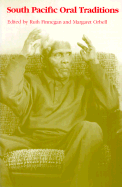Voices in Performance and Text
- Ruth Finnegan and Margaret Orbell, eds., South Pacific Oral Traditions (1995)
 This volume demonstrates that oral media and native cultural forms are still vital throughout the South Pacific. Contributions from anthropology, ethnomusicology, folklore, literature, and history raise issues in comparative scholarship on oral tradition... South Pacific Oral Traditions demonstrates that unwritten songs, dances, narratives, and laments – all drawing primarily on oral media and native cultural forms – are still being performed, transmitted, and newly created throughout the islands of the South Pacific. [from the back cover]
This volume demonstrates that oral media and native cultural forms are still vital throughout the South Pacific. Contributions from anthropology, ethnomusicology, folklore, literature, and history raise issues in comparative scholarship on oral tradition... South Pacific Oral Traditions demonstrates that unwritten songs, dances, narratives, and laments – all drawing primarily on oral media and native cultural forms – are still being performed, transmitted, and newly created throughout the islands of the South Pacific. [from the back cover] - J. M. Foley, The Singer of Tales in Performance (1995)
Both living oral traditions and texts with roots in oral tradition share a context in which the speaker performs for an audience, either real or implied.... This study dissolves the perceived barrier between “oral” and “written,” creating a composite theory from oral-formulaic theory and the ethnography of speaking and ethnopoetics.... Foley examines a wide range of genres – including Serbian charms, the Homeric Hymns, and the Anglo-Saxon hagiography Andreas – uncovering the expressive roots of oral-derived traditional works to recover both the performance event and its traditional context. [from the back cover]
- Werner Kelber, The Oral and the Written Gospel: The Hermeneutics of Speaking and Writing in the Synoptic Tradition, Mark, Paul, and Q, rev. ed. (1997)
 Spoken words process knowledge differently from writing. What happens when speech turns into text? In reappraising literary scholars’ propensity to trace Jesus’ sayings back to the assumed original version, the author argues that in the oral medium each rendition of a saying is the original. Orality works with multiple originals, rather than with single originality. In what may be the most extraordinary thesis of the book, Kelber argues that the written gospel is related less by evolutionary progression than by contradiction to what preceded it. [from the back cover]
Spoken words process knowledge differently from writing. What happens when speech turns into text? In reappraising literary scholars’ propensity to trace Jesus’ sayings back to the assumed original version, the author argues that in the oral medium each rendition of a saying is the original. Orality works with multiple originals, rather than with single originality. In what may be the most extraordinary thesis of the book, Kelber argues that the written gospel is related less by evolutionary progression than by contradiction to what preceded it. [from the back cover]


